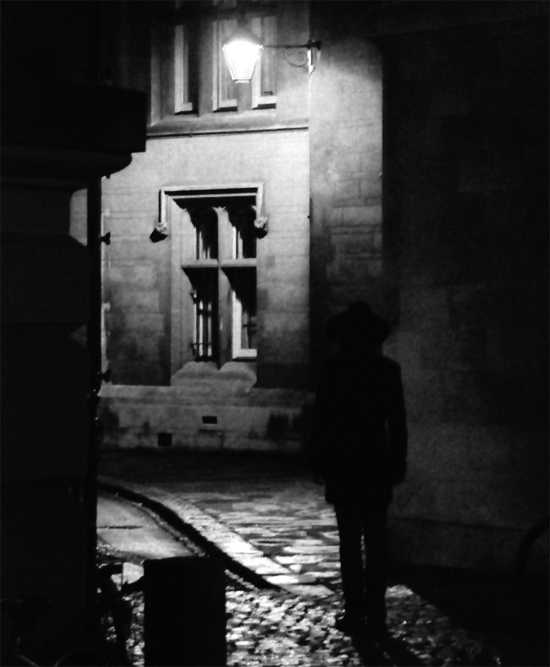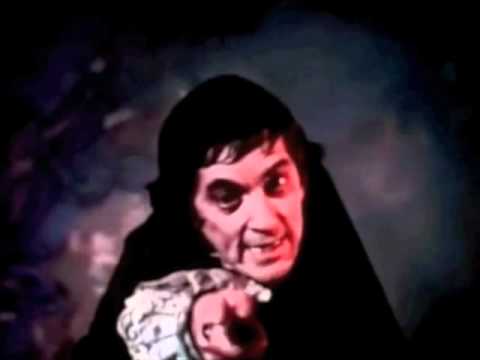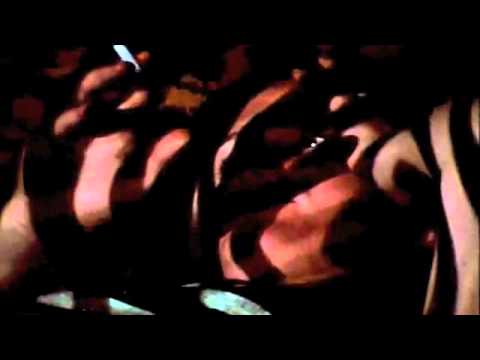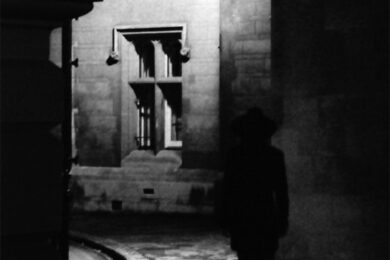Uncle Acid and the Deadbeats make gloriously twisted rock & roll, doused with flashes of psychedelic colour and imbued with elephantine groove. Crackling with imperfections, referencing the dark slant of 60s and 70s counterculture – and very much the product of a fascination with vintage analogue gear – last year’s Blood Lust LP was a glorious and idiosyncratic collection that quickly garnered rabid cult status amongst the worldwide doom fraternity.
Originally limited to a short run, the LP was re-released late last year by Rise Above, again going fast (and now selling for up to £700 on Discogs). But while Uncle Acid have been embraced by the doom scene, Blood Lust put as much stock on melody as stone hewn riffage, the fuzzed out two-part vocal harmonies evoking a chemical memory of Neil Young or Revolver-era Beatles.
A loose concept LP – based around the plot of an imagined long lost VHS horror movie – the album provides total headphone immersion, whether suitably, err, ‘refreshed’ or otherwise. And, in this age of tiresome and aggressive self-promotion, the Cambridge-based Deadbeats retain a dignified and old-fashioned sense of mystery: they’ve played only a handful of gigs, no photographs are in existence and Uncle himself refuses to use a telephone. The Quietus eventually managed to track him down via e-mail…
Tell us a little but about the start of Uncle Acid and the Deadbeats – I know in the past you’ve described the band as a studio project rather than gigging entity. Is this still the case? Who’s currently making music with you?
Uncle Acid: As you know, there aren’t many musicians going around Cambridge so we could never expand the lineup enough to play live consistently. We played a few times locally as a three piece, but it lacked power not having a rhythm guitar player. Also, pretty much all of the songs have two part harmonies and we couldn’t find anyone to replicate those live. Finding someone in this area who was into the music, could play guitar well and also sing harmony proved to be impossible. Years have gone by, people have dropped in and out recently, but Cambridge is dead in terms of music. The attention has shifted to London to find people – it seems to be working, so that’s where it all happens now. It if works out, we’ll get out and play again.
What provided the impetus to start the band?
UA: The urge just came to start writing, probably due to boredom and frustration. I was unemployed at the time and absolutely no one would hire me for anything. Months and months went by and I think I just completely lost my mind. Next thing I knew, I had all these songs, so I thought I’d start a band to record them. That became Vol. 1. The small profit we made off that was put straight into Blood Lust.
There are a lot of layers in your music – obviously there’s a Sabbath/Sleep thing going on, but there’s something else from the melodies – Neil Young, The Beatles – perhaps a slight NWOBHM vibe on something like ‘I’m Here To Kill You’. What music do you find yourself returning to?
UA: Yeah, I love all the music you mentioned. Really, anything with good melody appeals to me, from the Everly Brothers to Iron Maiden. Metal used to be full of bands with great melodies, but that seems to have gone out the window a long time ago. I go through different phases with bands, but the one constant is Neil Young. It took me a while to ‘get’ Neil Young, but once I did that was it. I’ve pretty much been listening to him non-stop for the last six years now.
How about the doom scene? You’ve been embraced by it, but your music doesn’t sit within the popular conception of that music. What are your feelings about this?
UA: I would agree. I think the doom scene is pretty diverse now, though. Bands are mixing in folk, psych, pop, jazz, all kinds of stuff, and the people that are into it are very open minded, which is fantastic. I love that kind of music too. In fact, just about the only new music I listen to comes from that scene. Stuff like Hour of 13, Blood Ceremony, The Devils Blood and, of course, Electric Wizard are still delivering. There are a lot of great bands in and around the doom scene, and I think we’re probably on the edge somewhere. We may never be heavy enough for some people, but that’s not really our objective.
Do you feel an affinity with any current bands?
UA: I like a lot of the new bands but I don’t really want to have a close affinity with anyone. It’s too dangerous. I don’t really want to end up becoming too tied down to a certain style or sound. To be honest, I’m sure people don’t really want to be associated with us either! It’s better to just roam the barren landscape. Find your own way to survive the madness.
How important is the visual element for what you do? I’m thinking about the videos for ‘Ritual Knife’ and ‘I’ll Cut You Down’? There seems to be a strong vintage aesthetic at play.
UA: There is a certain aesthetic that is very important, but at the same time, most people have no idea what we look like. There are no band photos, because it has nothing to do with the music. The songs and the videos and the album artwork are all people need to understand what we’re about. It’s all tied in to the idea of Blood Lust being presented as this obscure, partially destroyed film that no one knows anything about.
No one knows where it came from, who made it, who the actors are – nothing. It becomes a cult thing that gets passed around and then it eventually appears on VHS and shown on TV. That was the basic concept, and strangely that’s how things played out with the actual album in many ways. Anyway, within that idea is the plot of the Blood Lust film, with each song representing a part of the film. At the start of the album, you hear the TV channels changing before eventually settling on Blood Lust. At the end of the album, the TV switches off. The thing is, none of what I just told you really matters – it’s just there to give me a bigger picture to focus on and to inspire me to write lyrics. The songs themselves can be enjoyed without knowing what they’re about.
How does your writing process work?
UA: The music and the melodies are the easiest part, but writing lyrics to fit melodies is very difficult, which is why I have to come up with these concepts to give me some idea of what to write about. I’m probably not skilled enough to write an album of songs about random subjects; I need some kind of direction.
I’m also from Cambridge. It’s a strange place when it comes to music – always been difficult to get a scene going. I don’t think it’s been the same since the close of the Boatrace [legendary live venue] years back. What’s your take – have you found kindred spirits here?
UA: Yeah, it’s a real shame that they closed the Boatrace. To replace it with a wine bar says everything you need to know about Cambridge. Then there was the Barfly that lasted about six months. I don’t know what’s wrong with this place. Fenland people are obviously not into their music! I don’t really belong here. It’s a city full of students, but if I want to see a decent live band I have to spend £30 for the train down to London.
Last time we tried to play in Cambridge was a joke. I think there were three bands on the bill and the venue tried to charge each musician £10 to play. There was no stage, no monitors, nothing. The PA system consisted of a mic plugged into a guitar amp that was on top of a chair. What kind of operation do these people think they’re running? I’ll play in any old fucking dump, but I’m definitely not paying out my own pocket to do so.
This was a few years ago so maybe things have changed, I don’t know. We haven’t found any kindred spirits here. All the bands we ever played with hated us for some reason, and it seemed all the audiences hated us too. People would just walk out as soon as we started playing because it was obvious we weren’t an ‘indie’ band or whatever was cool at the time.
What gear are you using? Blood Lust has a distinct sound that could easily have come from the early 70’s. What was the recording process like?
UA: I mostly use stuff that gets overlooked and forgotten about. My main guitar is a Les Paul Junior. Johnny Thunders used to play them. It’s basically a slab of mahogany, painted piss yellow with a pickup nailed in to it. Then a fuzz pedal made by a small company called Basic Audio. Its a great ’60s style fuzz. That all goes into an old tweed amp. Really everything we use is just simple technology from the 50s and 60s. You can’t improve on that stuff.
For the recording I borrowed a load of ribbon mics, which got used on pretty much everything. Those things needed a lot of gain, so all the levels were pushed into the red and everything was bleeding all over the place to give us this kind of murky, hazy sound. Some people love the production and others hate it. I think it’s perfect.
It was the best that we could do with the money we had. People need to remember that this was all done on a shoestring budget and with no label backing – I paid for everything. No one was interested in having anything to do with us, but it didn’t matter because I was determined to put the album out regardless and, luckily, it’s worked out.
What have you got planned for 2012?
UA: I don’t like to plan anything. But, hopefully, record another album, play some live shows, re-release Blood Lust on vinyl and survive the apocalypse. We’ll just see what happens…





